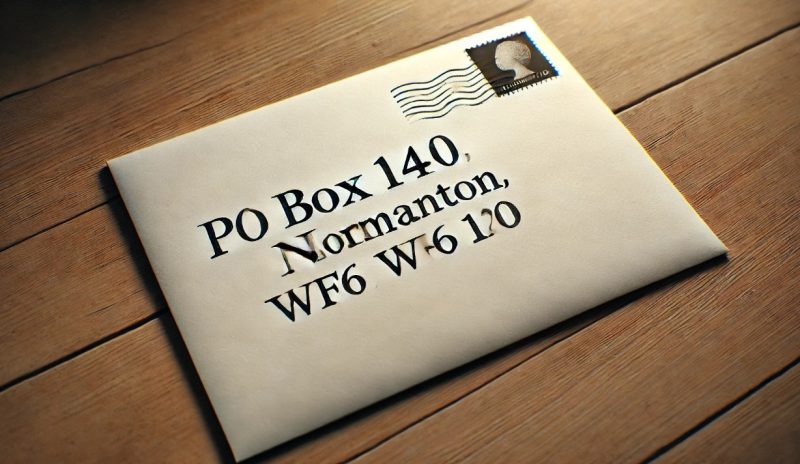Receiving an unexpected debt letter from an unfamiliar address, like PO Box 140 in Normanton WF6 1YA can be both confusing and alarming.
Such correspondence often raises questions about its legitimacy, the sender’s identity, and the right course of action. Many UK financial institutions and debt collection agencies use PO Boxes to streamline communication and maintain privacy.
PO Box 140 in Normanton is linked to entities like Britannia Personal Lending and Lloyds Banking Group, which can help verify its authenticity.
This article explores the potential senders, reasons for receiving these letters, how to verify their legitimacy, and the steps you should take to handle them
Who Owns PO Box 140 Normanton WF6 1YA?

The address, PO Box 140 Normanton WF6 1YA, is linked to various legitimate organisations, especially in the financial sector. These entities often use this return address to streamline their mail operations and maintain confidentiality.
The Organisations Using PO Box 140 Normanton WF6 1YA:
- Banks and Financial Institutions: Major players, including those in the Lloyds Banking Group, frequently use this address.
- Credit Providers and Lenders: This includes institutions like Britannia Personal Lending, known for offering financial services.
- PPI Companies: Businesses involved in processing payment protection insurance claims also utilise this address.
- Debt Collection Agencies: These organisations manage unpaid debts, such as credit card arrears, utility bills, and personal loans.
While letters from this address are typically legitimate, scammers may mimic such formats to deceive recipients. If you’re uncertain about a letter’s authenticity, reach out directly to your bank or creditor for verification.
Notably, Lloyds Banking Group is among the prominent users of this PO Box, emphasising its connection to financial correspondence. Always exercise caution and verify the sender before taking action.
Why Did You Receive a Letter from PO Box 140 Normanton WF6 1YA?
Receiving a letter from PO Box 140 Normanton WF6 1YA typically indicates that a financial institution or debt collection agency is attempting to contact you regarding a financial matter.
Common reasons for such correspondence include:
Outstanding Debts
- If you have unpaid loans or credit balances, the lender may reach out to discuss repayment options or notify you of overdue payments.
Account Updates
- Financial institutions may send information about changes to your account terms, interest rates, or other important updates.
Payment Reminders
- Friendly reminders about upcoming or missed payments to help you stay on track with your financial obligations.
Debt Recovery Actions
- In cases where debts have been unpaid for an extended period, the matter may be escalated to a debt collection agency tasked with recovering the owed amount.
It’s essential to carefully read the letter to understand its purpose. Look for specific details such as account numbers, the nature of the debt or account in question, and any actions required on your part.
This information will help you determine the legitimacy of the letter and the appropriate steps to take in response.
What Can You Do if You Get a Letter from PO Box 140 Normanton WF6 1YA?

If you receive a letter from PO Box 140 Normanton WF6 1YA, it’s essential to address it promptly and carefully. Start by opening and reading the letter to understand its content and any actions required. Ignoring such correspondence could lead to further complications.
Verify the legitimacy of the letter by checking for official logos, contact information, and references to your accounts. Cross-reference these details with your records to confirm authenticity.
Next, assess the claims made in the letter. Determine whether the debt or account mentioned is familiar to you by reviewing your financial records for accuracy.
If you need clarification, contact the sender using the information provided in the letter. Always ensure you are speaking with a legitimate representative by verifying their details on official websites. If you’re unsure how to proceed, seek advice from a financial advisor or debt advice service.
Lastly, keep records of all correspondence and notes from conversations for future reference. Taking these steps helps you handle the situation responsibly and avoid unnecessary complications.
How Do You Verify the Legitimacy of a Debt Collection Letter?
To verify the legitimacy of a debt collection letter from PO Box 140 Normanton WF6 1YA, consider the following:
- Check for Official Branding: Legitimate letters typically feature the company’s logo and official letterhead. Compare these with known authentic documents from the institution.
- Verify Contact Information: Ensure that the contact details match those listed on the official website of the purported sender. Be cautious of discrepancies.
- Review Account Details: Legitimate correspondence should include specific information about your account, such as account numbers and the amount owed. Cross-reference these with your records.
- Look for Regulatory Disclosures: In the UK, debt collection letters should include information about the company’s registration with the Financial Conduct Authority (FCA). Verify the company’s credentials on the FCA register.
- Be Wary of Urgent or Threatening Language: While debt collection letters may convey a sense of urgency, overly aggressive or threatening language can be a red flag for scams.
- Contact the Institution Directly: Use contact information obtained independently (e.g., from the official website) to reach out and confirm the letter’s authenticity.
By diligently assessing these factors, you can determine whether the letter is genuine and take appropriate action.
What Steps Should You Take After Receiving a Debt Notification Letter?

After receiving a debt notification letter from PO Box 140 Normanton WF6 1YA, it’s important to address it promptly and responsibly.
Start by acknowledging receipt of the letter. Open and read it thoroughly to understand the nature of the debt and identify the sender. Ignoring such correspondence can lead to unnecessary complications.
Verify the legitimacy of the letter by checking for official branding and contact details and cross-referencing the information with your records.
This ensures the letter is from a legitimate source and not a scam. Next, assess whether the debt is valid and belongs to you. Review your financial records to confirm the amount and origin of the debt.
If the debt is valid, respond promptly by contacting the sender to discuss repayment options. In case of an error, inform them immediately and provide any supporting evidence. Seek professional advice if needed, especially when negotiating repayment terms.
Finally, maintain records of all correspondence and communications for future reference. Taking these steps helps you address the situation effectively and work towards resolving the debt.
What to Do if the Debt Letter is Not Yours?
If you believe the debt letter was sent to you in error, follow these steps to resolve the matter:
- Contact the Sender Immediately: Inform the agency that the debt does not belong to you and request further investigation.
- Provide Evidence: Share any documents or proof that can establish the debt is not yours, such as identification or transaction records.
- Request a Written Confirmation: Ask the agency to confirm in writing that the debt is not yours and that no further contact will be made.
- Monitor Your Credit Report: Ensure no unauthorised accounts or debts appear on your credit file. You can request a free credit report from agencies like Experian or Equifax.
- Report Potential Fraud: If you suspect identity theft, report the issue to Action Fraud and obtain a crime reference number.
Taking prompt action will help you clear any misunderstandings and avoid unnecessary stress.
How Can You Contact PO Box 140 Normanton WF6 1YA?

If you need to reach out to the sender of a letter from PO Box 140 Normanton, use the following tips to ensure effective communication:
- Use the Contact Details Provided: The letter should include a phone number, email address, or mailing address for correspondence.
- Send Written Communications: For disputes or formal requests, use recorded mail to ensure a paper trail of your communication.
- Avoid Sharing Sensitive Information: Provide only the information necessary to address your concern. Avoid disclosing personal details over the phone unless you’re sure of the caller’s identity.
- Inquire About Alternative Contact Methods: Some agencies provide online portals or email services for easier communication.
These methods will help you stay in control while addressing your queries effectively.
What Are Your Consumer Rights When Dealing With Debt Collection Agencies?

UK law provides several important protections when dealing with debt collection agencies, including those associated with letters from PO Box 140 Normanton WF6 1YA.
These rights are in place to ensure fair treatment and safeguard consumers from harassment or unfair practices.
One of your key rights is the ability to request proof of the debt. Debt collectors are legally required to provide documentation that confirms you owe the amount in question. Without this, they cannot enforce collection.
You are also protected from harassment, such as excessive contact or threats. Debt collectors must adhere to reasonable contact hours and respect your preferred method of communication.
Your Legal Rights Include
- Dispute the Debt: If you believe the debt is inaccurate, you can challenge it without facing immediate legal action.
- Access Free Advice: Organisations like Citizens Advice and StepChange provide free support and guidance for managing debt issues.
- Lodge Complaints: If a debt collector violates your rights, you can report them to the Financial Ombudsman Service.
Understanding these rights allows you to handle debt collection matters confidently, ensuring fair treatment while addressing your financial obligations.
Conclusion
Receiving a debt letter from PO Box 140 Normanton WF6 1YA can feel daunting, but by understanding the sender and following the proper steps, you can navigate the situation confidently.
Whether it’s verifying the letter’s legitimacy, disputing an incorrect claim, or negotiating a repayment plan, staying informed and proactive is key.
Remember to exercise your consumer rights and seek professional advice when needed. Addressing such matters promptly will help you protect your financial health and avoid unnecessary complications.
Also, check out our guide on Who Sends Letter from PO Box 5622 Manchester? for more insights on handling similar debt-related correspondence.
FAQs About PO Box 140 Normanton WF6 1YA
How can I identify if a debt collection letter is a scam?
Scammers often send fraudulent debt letters. Carefully look for missing company details, unregistered contact numbers, and requests for unusual payment methods.
What happens if I ignore a debt letter from PO Box 140 Normanton?
Ignoring a legitimate debt letter can eventually lead to further collection actions, potentially affecting your credit score or leading to legal proceedings.
Are debt collection agencies allowed to visit my home?
Yes, but they must follow strict legal guidelines, including not harassing or illegally threatening you.
Can I request a breakdown of the debt mentioned in the letter?
Absolutely. You have every right to ask for a detailed explanation and validation of the debt.
What should I do if the debt mentioned is not mine?
Contact the agency immediately and quickly provide any evidence to dispute the debt, such as receipts or account records.
How can I stop debt collection calls and letters?
You can formally request in writing that the agency communicates only through specific channels, such as email, or consult a legal advisor for further assistance.
Does receiving a debt letter affect my credit score?
Not directly, but if the debt remains unpaid and eventually escalates to a default or court judgment, it can negatively impact your credit score.





